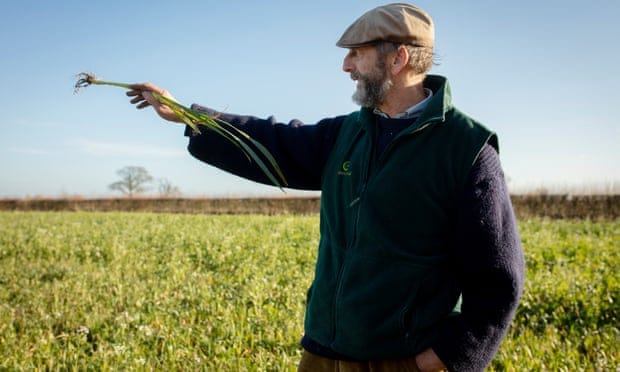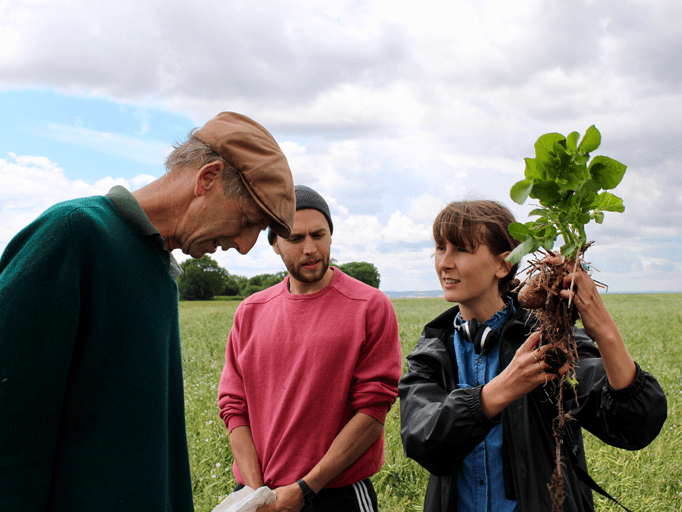'It's a groundswell': the farmers fighting to save the Earth's soil
Farmers across the world are ditching their ploughs to protect ecosystems – and it’s working

John Cherry bends down and takes a handful of soil in his hands, brings it up to his face and breathes deeply.
“You can smell when it is good,” he says, poking it with a finger. “This smells of roots … there is a rich, organic quality to it. It is a good smell.”
Cherry is one of a growing army of UK farmers who are turning their back on the plough – and centuries of farming tradition – in an effort to tackle a little-noticed but potentially devastating environmental crisis: the degradation of the Earth’s soil.
The UN has warned that soils around the world are heading for exhaustion and depletion, with an estimated 60 harvests left before they are too barren to feed the planet.
The Upside – sign up for our weekly email
Read more
That message was backed up in the UK by the environment secretary, Michael Gove, who warned that the country is 30 to 40 years away from “the fundamental eradication of soil fertility”. He added: “Countries can withstand coups d’état, wars and conflict, even leaving the EU, but no country can withstand the loss of its soil and fertility.”
The apocalyptic nature of the threat was underlined last month by a report that revealed that excessive use of pesticides had depleted the Earth’s soil and contributed to a drastic decline in insect numbers that threatened a “catastrophic collapse of nature’s ecosystems”.
But on his 800-hectare (2,000-acre) farm outside Stevenage, Hertfordshire, Cherry says that he and farmers like him around the world are fighting back.
The conservation agriculture movement he advocates means no ploughing or turning the soil, instead keeping the ground covered with crops all year round and growing a wide variety of plants.

The method involves more planning, but the benefits its advocates claim are remarkable – from plummeting costs on machinery and labour to a drastic reduction in fertiliser and chemicals. This in turn leads to a huge increase in insects, birds and wildlife, as well as fewer floods and more resilient crops during droughts.
Healthy soil can also absorb massive amounts of greenhouse gas emissions – playing a key role in the drive to tackle climate breakdown and the biodiversity crisis.
As kites and skylarks fly above his fields, Cherry says he first became interested in conservation agriculture – or no-till farming – after speaking to others who were trying it.
“I have always been interested in soil, which in the end is the most important thing about farming,” he says. “I went to see a farm where it was being done and when you see someone who is farming without moving the soil it is mind-blowing.”
The movement, which began in the US, is now taking off around the world. Conservation agriculture (CA) is widespread in the Americas because of its water-retention properties in drought-prone and hot areas – healthier soil can hold and retain much more water.
Some experts have sounded a note of caution, though. The Soil Association, which promotes organic farming, says it backs conservation but warns that it should not be seen as a silver bullet.
A report written by Peter Melchett for the organisation , published in December shortly after his death, said that while CA minimised soil disturbance, reduced erosion and increased organic matter, by itself it was not guaranteed to increase biodiversity or the amount of atmospheric carbon that farmland can absorb and hold.
It said farmers should also consider planting trees (agroforestry), introducing livestock on to arable farms, and having more diverse crop rotations bringing grassland into arable systems.
Nonetheless, the movement is taking off in the UK. Three years ago, Cherry organised the Groundswell festival on his land to spread the word about the environmental and economic benefits of looking after the soil. He was amazed when 700 people turned up.
Last year that number had jumped to 1,250, and this year, as word spreads to farms across the UK and Europe, he is worried the farm won’t be big enough to cope.
“This whole thing is farmer-led,” says Cherry. “It is coming up from below, with farmers talking to each other and seeing the benefits, then adapting that to work on their own farms. It is a groundswell of farmers doing it – that is where we got the name.”
Not ploughing avoids disrupting micro-organisms, including the fungal threads that drive the biological life of the soil. A mix of crops on the land increases the diversity and health of the bacteria in the soil, which in turn supports a wide variety of insects.
Cherry says that one of the many benefits is that he no longer needs slug pellets, as the soil supports a lot of slugs’ natural predators. However, he does still use some sprays to clear the winter crops.
Cherry says: “We are using fewer chemicals and less fertiliser year on year as the soil recovers. Our aim is to get to using no fertiliser or sprays at all.

“There are guys in the US who have been doing this for 30 years and their soil is so fertile, they have got so much going on in the ground, that you do not need to apply anything.”
Cherry, who works the farm with his brother Paul, turned to conservation agriculture eight years ago. The first few years they had their best ever returns as costs declined in terms of machinery, labour and pesticides but yields remained high.
Cherry says there were “a few disappointing years as the soil adjusted, but our costs kept going down”.
He adds: “After 15 years or so, what most people find is that your costs are right, right down and your yields are better then they were at the beginning. On top of that, you have a genuinely sustainable future ahead.”
The Campaign to Protect Rural England (CPRE) produced a report last year backing conservation agriculture as one method of replenishing degraded soils. It warned that a combination of industrial farming practices and poor land management have resulted in dangerous levels of soil erosion, compaction and declining fertility, which costs around £1.2bn a year in England and Wales.
Graeme Willis, the senior rural policy campaigner at the CPRE, says: “Soil is fundamental to delivering productive farming, a healthy countryside, and can play a key role in tackling climate change. But decades of neglect have degraded our soils to a point where much of this life-giving asset, which underpins the health of all living things, is no longer able to function as it should.
“Through conservation agriculture, farmers can reduce costs, use fewer chemicals and rebuild biological life in the soil, making it healthier, more resilient to extreme weather and able to support more wildlife. It’s win-win for farmers, the people they feed and the environment.”
Willis says there was a stark similarity between the human gut and soil in terms of planetary and human health. “Looking after the soil is much like looking after a healthy gut biome where variety is key: eat lots of different foods, especially plants, not too much wheat and cut back on the chemicals – for farming, pesticides and synthetic fertilisers, and for the gut, antibiotics and ultra-processed foods.”
Back on his farm Cherry is examining the soil and the tangle of winter crops that cover his field.
“The insects are the bottom of the food chain and there are so many things that eat them,” he says. “Since they have come back we have seen a huge increase in birds: skylarks, flocks of yellowhammers, kites, buzzards, and we are not doing anything special to attract them – they just love the fields, the system we have here.”
This article is part of a series on possible solutions to some of the world’s most stubborn problems. What else should we cover? Email us at theupside@theguardian.com
